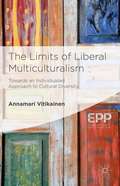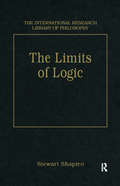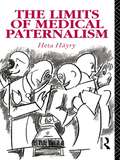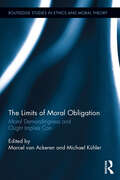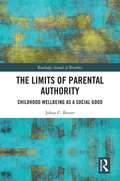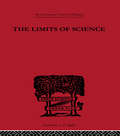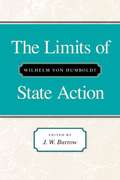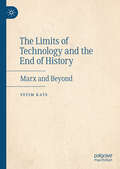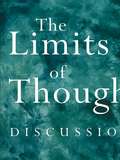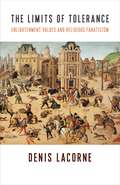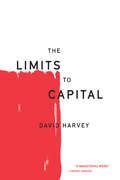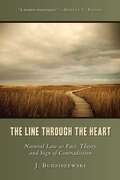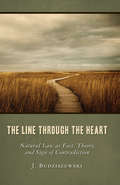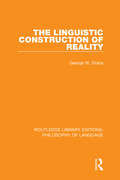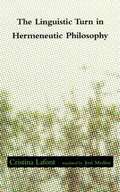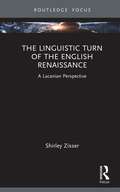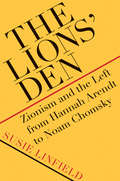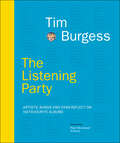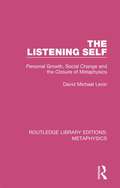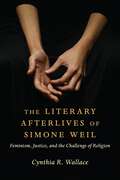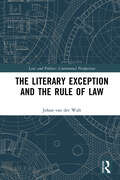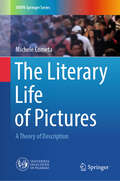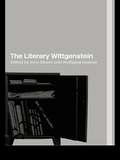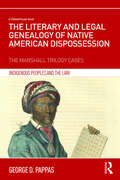- Table View
- List View
The Limits of Liberal Multiculturalism: Towards an Individuated Approach to Cultural Diversity (Palgrave Studies in Ethics and Public Policy)
by Annamari VitikainenThe Limits of Liberal Multiculturalism provides a timely analysis of some of the weaknesses, as well as the successes, of the liberal multicultural project. It also takes a step forward by developing a pluralist, individual-centred approach to allocating minority rights in practice.
The Limits of Logic: Higher-Order Logic and the Löwenheim-Skolem Theorem (The International Research Library of Philosophy #18)
by Stewart ShapiroThe International research Library of Philosophy collects in book form a wide range of important and influential essays in philosophy, drawn predominantly from English-language journals. Each volume in the library deals with a field of enquiry which has received significant attention in philosophy in the last 25 years and is edited by a philosopher noted in that field.
The Limits of Medical Paternalism (Social Ethics and Policy)
by Heta HäyryThe Limits of Medical Paternalism defines and morally assesses paternalistic interventions, especially in the context of modern medicine and health care, particular emphasis is given to the analysis of the conceptual background of the paternalism issue. In this book an anti-paternalistic view is presented and defended.
The Limits of Moral Obligation: Moral Demandingness and Ought Implies Can (Routledge Studies in Ethics and Moral Theory)
by Marcel Van Ackeren Michael KühlerThis volume responds to the growing interest in finding explanations for why moral claims may lose their validity based on what they ask of their addressees. Two main ideas relate to that question: the moral demandingness objection and the principle "ought implies can." Though both of these ideas can be understood to provide an answer to the same question, they have usually been discussed separately in the philosophical literature. The aim of this collection is to provide a focused and comprehensive discussion of these two ideas and the ways in which they relate to one another, and to take a closer look at the consequences for the limits of moral normativity in general. Chapters engage with contemporary discussions surrounding "ought implies can" as well as current debates on moral demandingness, and argue that applying the moral demandingness objection to the entire range of normative ethical theories also calls for an analysis of its (metaethical) presuppositions. The contributions to this volume are at the leading edge of ethical theory, and have implications for moral theorists, philosophers of action, and those working in metaethics, theoretical ethics and applied ethics.
The Limits of Parental Authority: Childhood Wellbeing as a Social Good (Routledge Annals of Bioethics)
by Johan C. BesterThis book offers a novel theory of childhood well-being as a social good. It re-examines our fundamental assumptions about parenting, parental authority, and a liberal society’s role in the raising of children. The author defends the idea that the good of a child is inexorably linked to the good of society. He identifies and critiques the problematic assumption that parenting is an extension of individual liberty and shows how we run into problems in medical decision-making for children because of this assumption. He develops an objective conception of what is good for a child in a liberal society, drawing on the assumptions of liberty, and from here constructs a set of things that society and its members owe children. There are ways in which society should support and intervene in parental decisions to guarantee a child’s well-being. Ultimately, raising children is a social activity that requires input from society. The author then applies this theory of childhood well-being to develop a framework for medical decision-making for children. He also uses practical examples, such as vaccinations, parental leave, and healthcare access, to demonstrate the implications of his theory for public policy. The Limits of Parental Authority: Childhood Wellbeing as a Social Good will be of interest to practitioners, scholars, and advanced students working in bioethics, political philosophy, and public health policy.
The Limits of Science: Outline of Logic and of the Methodology of the Exact Sciences (International Library of Philosophy)
by Leon ChwistekThis is Volume III of eight in a series on the Philosophy of Logic and Mathematics. Originally published in 1948, this book portrays an outline of logic and of the methodology of the exact sciences.
The Limits of State Action
by Wilhelm Von Humboldt J. W. BurrowThe Limits of State Action has an exuberance and attention to principle that make it a valuable introduction to classical liberal political thought It is also crucial for an understanding of liberalism as it developed in Europe at the turn of nineteenth century. Humboldt explores the role that liberty plays in individual development, discusses criteria for permitting the state to limit individual action's and suggests ways of confining the state to its proper bounds.
The Limits of State Action
by Wilhelm Von HumboldtThe grand, leading principle, towards which every argument . . . unfolded in these pages directly converges, is the absolute and essential importance of human development in its richest diversity. This description by Wilhelm von Humboldt of his purpose in writing The Limits of State Action animates John Stuart Mill's On Liberty and serves as its famous epigraph. Seldom has a book spoken so dramatically to another writer. Many commentators even believe that Humboldt's discussion of issues of freedom and individual responsibility possesses greater clarity and directness than Mill's. The Limits of State Action, by "Germany's greatest philosopher of freedom," as F. A. Hayek called him, has an exuberance and attention to principle that make it a valuable introduction to classical liberal political thought. It is also crucial for an understanding of liberalism as it developed in Europe at the turn of the nineteenth century. Humboldt explores the role that liberty plays in individual development, discusses criteria for permitting the state to limit individual actions, and suggests ways of confining the state to its proper bounds. In so doing, he uniquely combines the ancient concern for human excellence and the modern concern for what has come to be known as negative liberty. J. W. Burrow is Professor of History at the University of Sussex.
The Limits of Technology and the End of History: Marx and Beyond
by Yefim KatsThis book examines the long-standing belief in infinite scientific and technological progress and links it to the Enlightenment ideal of man as a universal being and subject of the universal world history, destined to become a 'master and possessor of nature.' The author analyzes a broad range of issues in epistemology, the philosophy of history, and the philosophy of science and technology. Marx’s philosophy is explored to the extent that his dialectic of labor sheds light on Western technological optimism and the ideal of human universality and offers an elaborate framework for analyzing the intrinsic limits to technological progress. The focus is on his ‘early’ works, providing a theoretical and humanistic underbelly for the ‘mature’ ideas of the Capital. Examining the epistemic foundations of the belief in infinite progress, the author argues that actual infinity, either in the form of unbounded technological/scientific expansion or infinite complexity of nature, is redundant for the universality of man, his scientific pursuit and historical experience. The conundrum of universality and power calls for a systematic critique of instrumental reason, its practical applicability and value structure.
The Limits of Thought: Discussions between J. Krishnamurti and David Bohm
by J. Krishnamurti David BohmThe Limits of Thought is a series of penetrating dialogues between the great spiritual leader, J. Krishnamurti and the renowned physicist, David Bohm.The starting point of their engaging exchange is the question: If truth is something different than reality, then what place has action in daily life in relation to truth and reality? We see Bohm and Krishnamurti explore the nature of consciousness and the condition of humanity. These enlightening dialogues address issues of truth, desire awareness, tradition, and love.Limits of Thought is an important book by two very respected and important thinkers. Anyone interested to see how Krishnamurti and Bohm probe some of the most essential questions of our very existence will be drawn to this great work.
The Limits of Tolerance: Enlightenment Values and Religious Fanaticism (Religion, Culture, and Public Life #4)
by Denis LacorneThe modern notion of tolerance—the welcoming of diversity as a force for the common good—emerged in the Enlightenment in the wake of centuries of religious wars. First elaborated by philosophers such as John Locke and Voltaire, religious tolerance gradually gained ground in Europe and North America. But with the resurgence of fanaticism and terrorism, religious tolerance is increasingly being challenged by frightened publics.In this book, Denis Lacorne traces the emergence of the modern notion of religious tolerance in order to rethink how we should respond to its contemporary tensions. In a wide-ranging argument that spans the Ottoman Empire, the Venetian republic, and recent controversies such as France’s burqa ban and the white-supremacist rally in Charlottesville, The Limits of Tolerance probes crucial questions: Should we impose limits on freedom of expression in the name of human dignity or decency? Should we accept religious symbols in the public square? Can we tolerate the intolerant? While acknowledging that tolerance can never be entirely without limits, Lacorne defends the Enlightenment concept against recent attempts to circumscribe it, arguing that without it a pluralistic society cannot survive. Awarded the Prix Montyon by the Académie Française, The Limits of Tolerance is a powerful reflection on twenty-first-century democracy’s most fundamental challenges.
The Limits to Capital
by David HarveyThe Limits to Capital provides one of the best theoretical guides to the history and geography of capitalist development. In this new edition, Harvey updates his classic text with a substantial discussion of the turmoil in world markets today.In his analyses of ‘fictitious capital’ and ‘uneven geographical development’ Harvey takes the reader step by step through layers of crisis formation, beginning with Marx’s controversial argument concerning the falling rate of profit, moving through crises of credit and finance, and closing with a timely analysis geopolitical and geographical considerations.
The Line Through the Heart: Natural Law as Fact, Theory, and Sign of Contradiction
by J. BudziszewskiWhy do we demand happiness on terms that make happiness impossible? And what can we do about it? Acclaimed philosopher J. Budziszewski addresses these questions in the brilliantly persuasive book The Line Through the Heart, finding the answers in the natural law. The journey of exploration takes us through politics, religion, ethics, law, philosophy, and more, with Budziszewski as expert guide. While investigating the natural law and its implications, Budziszewski boldly confronts a wide range of contemporary issues, offering a newly integrated view of abortion, evolution, euthanasia, capital punishment, runaway courts, and the ersatz state religion built in the name of religious toleration. Written in Budziszewski's usual crystalline style, The Line Through the Heart shows that natural law is a matter of concern not merely to scholars but to everyone, for it touches how each of us lives, and how all of us live together. His profound examination of this subject helps us make sense of why habits that run against our nature have become second nature, and why our world seems to be going mad.
The Line through the Heart: Natural Law as Fact, Theory, and Sign of Contradiction
by J. BudziszewskiThe suicidal proclivity of our time, writes the acclaimed philosopher J. Budziszewski, is to deny the obvious. Our hearts are riddled with desires that oppose their deepest longings, because we demand to have happiness on terms that make happiness impossible. Why? And what can we do about it?Budziszewski addresses these vital questions in his brilliantly persuasive new book, The Line Through the Heart. The answers can be discovered in an exploration of natural law--a venture that, with Budziszewski as our expert guide, takes us through politics, religion, ethics, law, philosophy, and more.Natural law, the author states plainly but provocatively, is a fact about human beings; as surely as we have hands and feet, we have the foundational principles of good and evil woven into the fabric of our minds. From this elemental fact emerges a natural law theory that unfolds as part of a careful study of the human person. Thus, Budziszewski shows, natural law forms a common ground for humanity.But this common ground is slippery. While natural law is truly an observable part of human nature, human beings are hell-bent--quite literally--on ignoring it. The mere mention of the obligations imposed on man by his nature will send him into a rage. In this sense, The Line Through the Heart explores natural law as not simply a fact and a theory but also a sign of contradiction.While investigating the natural law and its implications, Budziszewski boldly confronts--and offers a newly integrated view of--a wide range of contemporary issues, including abortion, evolution, euthanasia, capital punishment, the courts, and the ersatz state religion being built in the name of religious toleration.Written in Budziszewski's usual crystalline style, The Line Through the Heart makes clear that natural law is a matter of concern not merely to scholars; it touches how each of us lives, and how all of us live together. His profoundly important examination of this subject helps us make sense of why habits that run against our nature have become second nature, and why our world seems to be going mad.
The Linguistic Construction of Reality
by George W. GraceThis book, originally published in 1987, considers how the science of linguistics creates its own objects of study. It argues that language is the one essential tool in the ‘social construction of reality’ – the way in which our environment as we perceive and respond to it is actually created by the cultural constructs we bring to bear on it – and that it is also the means by which this reality, once constructed, is preserved and transmitted from person to person and from generation to generation. Hence it is entirely appropriate to refer to the linguistic construction of reality.
The Linguistic Turn in Hermeneutic Philosophy
by Cristina Lafont José MedinaThe linguistic turn in German philosophy was initiated in the eighteenth century in the work of Johann Georg Hamann, Johann Gottfried von Herder, and Wilhelm von Humboldt. It was further developed in this century by Martin Heidegger, and Hans-Georg Gadamer extended its influence to contemporary philosophers such as Karl-Otto Apel and Habermas. This tradition focuses on the world-disclosing dimension of language, emphasizing its communicative over its cognitive function. Although this study is concerned primarily with the German tradition of linguistic philosophy, it is very much informed by the parallel linguistic turn in Anglo-American philosophy, especially the development of theories of direct reference. Cristina Lafont draws upon Hilary Putnam's work in particular to criticize the linguistic idealism and relativism of the German tradition, which she traces back to the assumption that meaning determines reference. Part I is a reconstruction of the linguistic turn in German philosophy from Hamann to Gadamer. Part II offers the deepest account to date of Habermas's approach to language. Part III shows how the shortcomings of German linguistic philosophy can be avoided by developing a consistent and more defensible version of Habermas' theory of communicative rationality.
The Linguistic Turn of the English Renaissance: A Lacanian Perspective (Routledge Focus on Mental Health)
by Shirley ZisserThe Linguistic Turn of the English Renaissance: A Lacanian Perspective examines a selection of cultural phenomena of the English Renaissance, all of which include a focus on language, from a Lacanian perspective. The book examines four inter-related cultural symptoms of the English Renaissance: the paucity of painting, the interest in rhetoric, the emergence of a literary style focusing on form and a fascination with the myth of Orpheus. The book argues that the English Renaissance, an apex of rhetorical theory, can offer psychoanalysis further knowledge concerning the intrication of language and flesh, especially where feminine jouissance is at stake. These language-centred phenomena emerge against the backdrop of a peculiar configuration of the visual field, which in contrast to other cultures of the European Renaissance is largely barren of painting other than portraiture. The book will be of interest to psychoanalysts, scholars of Renaissance culture and those interested in the psychoanalytic study of culture.
The Lions' Den: Zionism and the Left from Hannah Arendt to Noam Chomsky
by Susie LinfieldA lively intellectual history that explores how prominent midcentury public intellectuals approached Zionism and then the State of Israel itself and its conflicts with the Arab world In this lively intellectual history of the political Left, cultural critic Susie Linfield investigates how eight prominent twentieth-century intellectuals struggled with the philosophy of Zionism, and then with Israel and its conflicts with the Arab world. Constructed as a series of interrelated portraits that combine the personal and the political, the book includes philosophers, historians, journalists, and activists such as Hannah Arendt, Arthur Koestler, I. F. Stone, and Noam Chomsky. In their engagement with Zionism, these influential thinkers also wrestled with the twentieth century’s most crucial political dilemmas: socialism, nationalism, democracy, colonialism, terrorism, and anti-Semitism. In other words, in probing Zionism, they confronted the very nature of modernity and the often catastrophic histories of our time. By examining these leftist intellectuals, Linfield also seeks to understand how the contemporary Left has become focused on anti-Zionism and how Israel itself has moved rightward.
The Listening Party: Artists, Bands and Fans Reflect on 100 Favorite Albums
by Tim BurgessThe Charlatans&’ Tim Burgess invites you to the greatest listening party of all time. In 2020 when the world was forced to hit pause on live in-person gigs, Tim Burgess found an ingenious way to bring people together by inviting artists and bands, from Paul McCartney and New Order to Michael Kiwanuka and Kylie, to host real-time album playbacks via Twitter. Relive 100 of the most memorable listening parties here with stories from bands and fans, rarely seen backstage images, and unique insider info from those who created these iconic albums. "Hey Twitter, let's all say a big thanks to Tim for these brilliant events this year! We really needed them. So much great music being talked about.'" - Sir Paul McCartney "Twitter being used for something really positive." - Mary Beard
The Listening Self: Personal Growth, Social Change and the Closure of Metaphysics (Routledge Library Editions: Metaphysics #4)
by David Michael LevinOriginally published in 1989. In this interdisciplinary study, Dr Levin offers an account of personal growth and self-fulfilment based on the development of our capacity for listening. This book should be of interest to advanced students of critical theory, psychology, cultural studies, ethics, continental philosophy, ontology, metaphysics.
The Literary Afterlives of Simone Weil: Feminism, Justice, and the Challenge of Religion (Gender, Theory, and Religion)
by Cynthia R. WallaceThe French philosopher-mystic-activist Simone Weil (1909–1943) has drawn both passionate admiration and scornful dismissal since her early death and the posthumous publication of her writings. She has also provoked an extraordinary range of literary writing focused on not only her ideas but also her person: novels, nonfiction, and especially poetry. Given the challenges of Weil’s ethic of self-emptying attention, what accounts for her appeal, especially among women writers?This book tells the story of some of Weil’s most dedicated—and at points surprising—literary conversation partners, exploring why writers with varied political and religious commitments have found her thought and life so resonant. Cynthia R. Wallace considers authors who have devoted decades of attention to Weil, such as Adrienne Rich, Annie Dillard, and Mary Gordon, and who have written poetic sequences or book-length verse biographies of Weil, including Maggie Helwig, Stephanie Strickland, Kate Daniels, Sarah Klassen, Anne Carson, and Lorri Neilsen Glenn. She illuminates how writing to, of, and in the tradition of Weil has helped these writers grapple with the linked harms and possibilities of religious belief, self-giving attention, and the kind of moral seriousness required by the ethical and political crises of late modernity. The first book to trace Weil’s influence on Anglophone literature, The Literary Afterlives of Simone Weil provides new ways to understand Weil’s legacy and why her provocative wisdom continues to challenge and inspire writers and readers.
The Literary Exception and the Rule of Law (Law and Politics)
by Johan Van Der WaltAddressing the influential analysis of law and literature, this book offers a new perspective on their relationship. The law and literature movement that has gained global prominence in the course of last decades of the twentieth and the first decades of the twenty-first centuries has provided the research and teaching of law with a considerable body of new and valuable knowledge and understanding. Most of the knowledge and insights generated by the movement concern either a thematic overlap between legal and literary discourses – suggesting they deal with the same moral concerns – or a rhetorical, semiotic or general linguistic comparability or ‘sameness’ between them – imputing to both the same or very similar narrative structures. The Literary Exception and the Rule of Law recognises the wealth of knowledge generated by this approach to the relationship between law and literature, and acknowledges its debt to this genre of scholarship. It nevertheless also proposes, on the basis of a number of revealing phenomenological inquiries, a different approach to law and literary studies: one that emphasises the irreducible difference between law and literature. It does so with the firm believe that a regard for the very different and indeed opposite discursive trajectories of legal and literary language allows for a more profound understanding of the unique and indeed separate roles that the discourses of law and literature generally play in the sustenance of relatively stable legal cultures. This important rethinking of the relationship between law and literature will appeal to scholars and students of legal theory, jurisprudence, philosophy, politics and literary theory.
The Literary Life of Pictures: A Theory of Description (UNIPA Springer Series)
by Michele CometaThis book offers a theory of ekphrasis—the literary description of an artwork—from the perspective of Visual Culture studies. A theory of ekphrasis must take into account not only the rhetorical strategies articulated in the description of artworks, but also the complex interplay that holds together the pictures that are described, the gazes that rest on them, and the dispositives that mediate them. It is therefore a matter of linking the study of the verbal rhetoric with the dynamics that are established between the author, the reader, and the visual artworks, real or fictive, as well as the performative aspects of description and the mediascapes that, from time to time, condition the gaze and the visual experience of the authors and the readers. This book proposes thus to consider both the intradiegetic aspects of description and the extradiegetic ones that condition its verbal texture. Following the rhetorics of ekphrasis throughout the Western tradition, from its origins in Philostratus, its reappraisal by Johann Joachim Winckelmann, to the twentieth-century avant-garde, this book shows how ekphrastic techniques are historically determined by the relationship between pictures, gazes, and dispositives.
The Literary Wittgenstein
by John Gibson Wolfgang HuemerThe Literary Wittgenstein is a stellar collection of articles relating the philosophy of Ludwig Wittgenstein (1889-1951) to core problems in the theory and philosophy of literature. Amid growing recognition that Wittgenstein's philosophy has important implications for literary studies, this book brings together twenty-one articles by the most prominent figures in the field. Eighteen of the articles are published here for the first time.The Literary Wittgenstein applies the approach of Wittgenstein to core areas of literary theory, including poetry, deconstruction, the ethical value of literature, and the nature and logic of fictional discourse. The literary dimension of Wittgenstein's own writings is also explored, such as the authorial strategy of the Tractatus, and writing and method in the Philosophical Investigations. Major literary figures discussed in the book include William Faulkner, Joseph Conrad, and Friedrich Hölderlin.By mapping out the foundations of a new approach to literature, The Literary Wittgenstein is essential reading for anyone interested in the relevance and application of Wittgenstein's thought to literary theory, aesthetics, and the philosophy of language and logic.
The Literary and Legal Genealogy of Native American Dispossession: The Marshall Trilogy Cases (Indigenous Peoples and the Law)
by George D PappasThe Literary and Legal Genealogy of Native American Dispossession offers a unique interpretation of how literary and public discourses influenced three U.S. Supreme Court Rulings written by Chief Justice John Marshall with respect to Native Americans. These cases, Johnson v. M’Intosh (1823), Cherokee Nation v. Georgia (1831) and Worcester v. Georgia (1832), collectively known as the Marshall Trilogy, have formed the legal basis for the dispossession of indigenous populations throughout the Commonwealth. The Trilogy cases are usually approached as ‘pure’ legal judgments. This book maintains, however, that it was the literary and public discourses from the early sixteenth through to the early nineteenth centuries that established a discursive tradition which, in part, transformed the American Indians from owners to ‘mere occupants’ of their land. Exploring the literary genesis of Marshall’s judgments, George Pappas draws on the work of Michel Foucault, Edward Said and Homi Bhabha, to analyse how these formative U.S. Supreme Court rulings blurred the distinction between literature and law.
